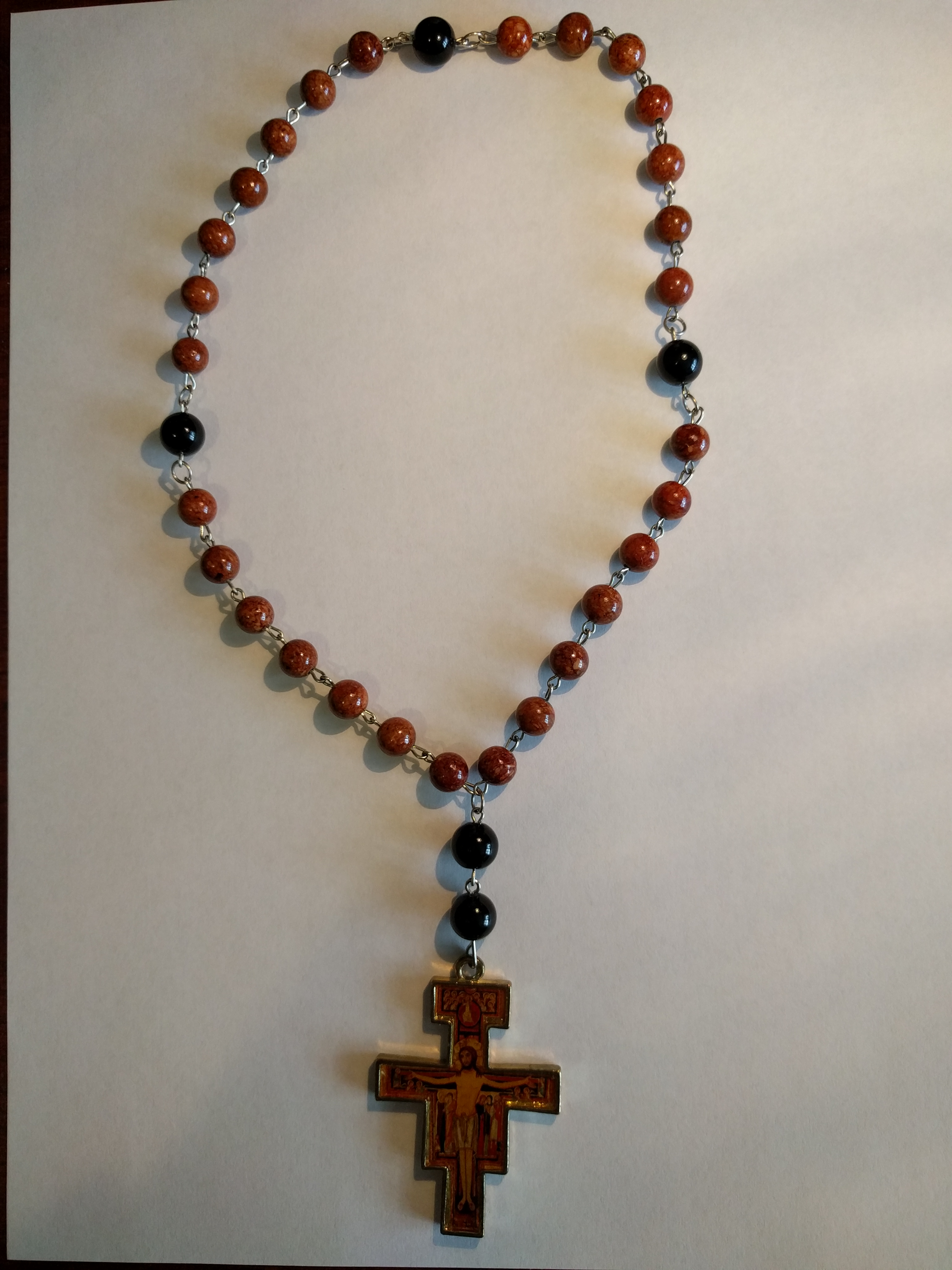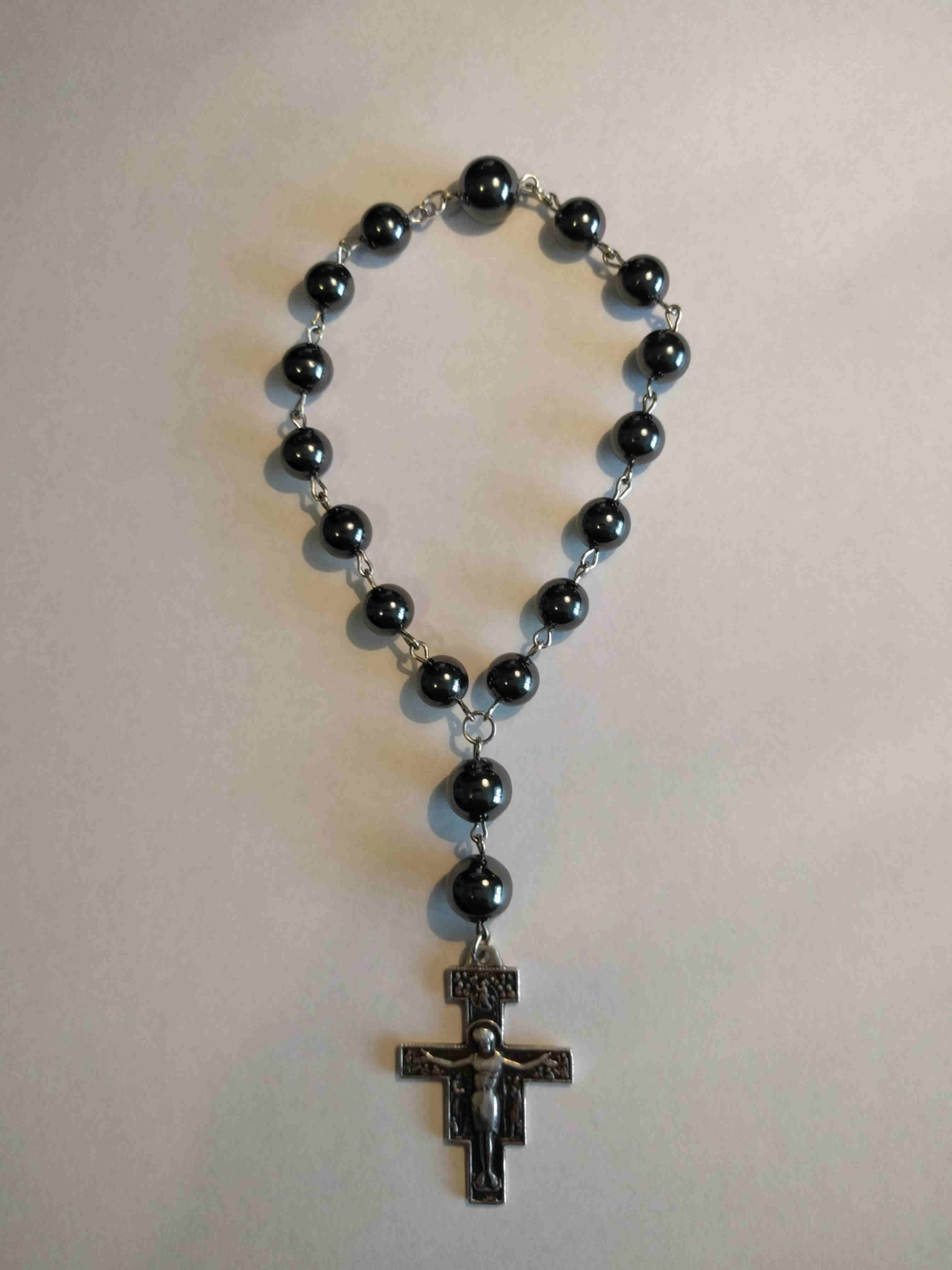Anglican Rosary/Anglican Prayer Beads
Ken
Norian, TSSF
When most people think of a rosary or prayer beads, the Roman
Catholic Rosary is most likely to come to mind - or perhaps Muslim, Buddhist, or
Hindu Prayer beads. Eastern Orthodox
prayer ropes or beads are also very popular.
But, the use of prayer beads is increasing among people of many Christian faith
traditions, including the Anglican Communion, of which the Episcopal Church is
a part.
The use of beads (or knotted cords, or stones) to
count prayers exists in early records of nearly every spiritual tradition. The
use of prayers beads fosters contemplative, meditative, and reflective
prayer. The use of prayer beads creates
a rhythm that discourages distractions and focuses attention so that the one
who prays can more readily move into God’s presence.
Within Christian churches the use of prayer ropes/beads in the Eastern Orthodox tradition (using the Jesus Prayer and a meditative focus) and the Rosary in the Roman Catholic tradition (using meditation on the life of Christ and his mother Mary) both go back thousands of years. Anglican Prayer Beads (also referred to as the Anglican Rosary) is a relatively new prayer form that dates back to the mid 1980’s. Its design comes from a group of Episcopalians (Praxis) who melded the Eastern Orthodox Prayer Rope and Roman Catholic Rosary to create a new “Anglican” form.

Anglican Prayer Beads are grounded in Anglican incarnational theology and also draws heavily form the Celtic tradition which celebrates the sactity of all of God's creation. They are made up of four groups of seven beads. Each of these groups of seven beads are called "weeks".
Four "cruciform beads" create four groups of
seven beads to form a “month”. When the beads are separated, these four beads
highlight the points of the cross
The symbolism of the design of Anglican Prayer Beads
is significant. Seven represents the
number of days in the secular week, the number of days in creation, the number
of seasons in the Anglican church year, and symbolizes
wholeness or completion in the Bible.
The four Cruciform beads form a cross and symbolize the four cardinal
directions (north, south, east, and west) the four gospels and the four primary
elements (earth, water, wind, and fire).
The Invitatory, or entry bead, just above the cross
invites us into prayer and contemplation.
The full number of beads totals 33 - the number of
years that Jesus lived on the earth and also corresponds to one of the forms of
the Chotki, the Eastern Orthodox prayer rope with 33
knots.
The movement through the prayer beads begins with the
cross, moves to the invitatory bead, on to the first cruciform then around
through the week beads and other cruciforms. Often there are three rotations through the
circle of beads ending with the final invitatory bead and cross.
In true Anglican tradition, there is no singular or “correct”
way to use the prayer beads. There are
some guidelines as well as some resources that may be useful to get started.
The following is a very simple form that I use most
often.
CROSS: In the name of God, Creator, Redeemer, and Sanctifier, or In the name of the Father, Son and Holy Spirit
INVITATORY BEAD:
(Trisagion)
Holy God
Holy and Mighty
Holy Immortal One
Have mercy on me.
CRUCIFORM BEAD(S):
My God and my all. (prayer St. Francis once
prayed all night to God while in rapt contemplation)
WEEK BEADS: Jesus Prayer - Lord Jesus Christ, have mercy on me.
This cycle may be completed three times.
After the fourth week and last cruciform, repeat the
Invitatory.
FINAL CROSS:
May the God of hope fill me with all joy and peace in believing through
the power of the Holy Spirit.
The Lord's prayer may be said on the final Cruciform
in place of “My
God and my All”, and sometimes a different final invitatory is used.
Some forms have different short meditations that are
used for each "day" within the week.
I prefer a minimalist rota of prayers (closer
in meditative practice to the traditional Jesus Prayer). But, again, the beauty of Anglican Prayer
Beads are that the user can develop forms that best resonate to their
spirituality and style of prayer.
There are several sources of information and sample prayer forms available on the internet. Typing "Anglican Rosary" or "Anglican Prayer Beads" into any search engine will yield hundreds of results.
I am a person who commutes to, from and within

While praying the Jesus Prayer is a specific form of
prayer, I find the spirituality involved helpful to praying with Anglican
Prayer Beads. The following article may
be helpful to understanding the Jesus Prayer and is also useful in praying the
Jesus Prayer in the context of the Anglican Rosary:
http://www.norian.org/jesus_prayer.html
Using
Anglican Prayer Beads is one of many ways of entering into the presence of God,
of bringing our hearts closer to the heart of our Creator, Redeemer and
Sanctifier. I am not a trained Spiritual
Director and not an expert in contemplative, meditative, or reflective
prayer. I am, however, open to sharing
my thoughts and experiences with any who have questions about this form of
prayer which so many are finding to be a blessing in their lives. I may be contacted from My Home Page
Following is another form that I also use with the Anglican Prayer Beads/The Anglican Rosary.
A Franciscan Form for Use with Anglican Prayer Beads
by Ken
Norian, TSSF
CROSS:
In the name of God, Creator, Redeemer, and Sanctifier. Amen
INVITATORY:
Both here and in all your churches
throughout the whole world we adore you O Christ, and we bless you, because by
your Holy Cross you have redeemed the world.
1ST CRUCIFORM:
Most high and glorious God. Give light to the darkness of my mind. Give me right faith, certain hope, and perfect
charity. Lord give me insight and
wisdom, so I might always discern your holy and true
will.
WEEK BEADS:
Lord
Jesus Christ,
Son of God,
have mercy on me.
WEEKLY CRUCIFORMS:
My God and my all.
LAST CRUCIFORM:
The Lord’s Prayer.
INVITATORY:
May our blessed Lady pray for us.
May Saint Francis pray for us.
May Saint Clare pray for us.
May all Franciscan saints pray for us.
May the holy angels watch
over us and befriend us
CROSS:
Let us bless the Lord.
Thanks be to God.

